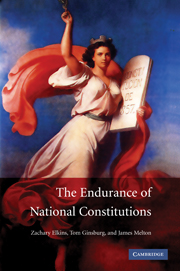Book contents
- Frontmatter
- Contents
- Preface
- 1 Introduction
- 2 How Long Should Constitutions Endure?
- 3 Conceptualizing Constitutions
- 4 What Makes Constitutions Endure?
- 5 Identifying Risks to Constitutional Life
- 6 An Epidemiological Analysis of Constitutional Mortality
- 7 Cases of Constitutional Mortality, Part I: Similar Contexts, Contrasting Outcomes
- 8 Cases of Constitutional Mortality, Part II: Contrasting Contexts, Similar Outcomes
- Conclusion
- Appendix
- References
- Index
8 - Cases of Constitutional Mortality, Part II: Contrasting Contexts, Similar Outcomes
Published online by Cambridge University Press: 05 June 2012
- Frontmatter
- Contents
- Preface
- 1 Introduction
- 2 How Long Should Constitutions Endure?
- 3 Conceptualizing Constitutions
- 4 What Makes Constitutions Endure?
- 5 Identifying Risks to Constitutional Life
- 6 An Epidemiological Analysis of Constitutional Mortality
- 7 Cases of Constitutional Mortality, Part I: Similar Contexts, Contrasting Outcomes
- 8 Cases of Constitutional Mortality, Part II: Contrasting Contexts, Similar Outcomes
- Conclusion
- Appendix
- References
- Index
Summary
This chapter continues our exploration of the constitutional histories of individual states, this time drawing from a sample of states selected with an inverse set of criteria from the previous chapter. In a variation of a most-different systems design (Przeworski and Teune 1970), we investigate a set of cases with a highly contrasting set of social and political conditions, but a similar set of outcomes. This set of cases includes some of the most intriguing constitutional chronologies from the standpoint of endurance.
We begin with a triad of cases – the Dominican Republic, Haiti, and Thailand – places where constitutions rarely survive more than seven or eight years. In some ways this amounts to a paired comparison (Haiti/Dominican Republic against Thailand), as the first two – both occupants of the Island of Hispaniola – have developed in parallel fashion. A focus on Haiti and the Dominican Republic takes on added significance as these two countries account for roughly 7 percent of the world's historical constitutions. Constitutions from the Island of Hispaniola, it seems, exhibit extremely high rates of infant mortality. We compare this duo to Thailand, where constitutional mortality has also been high. Key themes in the trajectory of the Hispaniola cases are the lack of inclusion and potentially overzealous constraints on executive power, which have tempted presidents to cast the written document aside repeatedly. Thailand is a somewhat anomalous case in which constitutional failure is arguably facilitated by unwritten rules around the country's long-serving monarch.
- Type
- Chapter
- Information
- The Endurance of National Constitutions , pp. 179 - 206Publisher: Cambridge University PressPrint publication year: 2009



